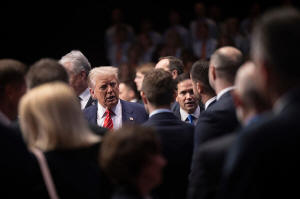NATO leaders agree to hike military spending and restate 'ironclad
commitment' to collective defense
[June 26, 2025]
By MIKE CORDER, SYLVIE CORBET, MOLLY QUELL and LORNE COOK
THE HAGUE, Netherlands (AP) — NATO leaders agreed on a massive hike in
defense spending Wednesday after pressure from U.S. President Donald
Trump, and expressed their “ironclad commitment” to come to each other’s
aid if attacked.
The 32 leaders endorsed a final summit statement saying: “Allies commit
to invest 5% of GDP annually on core defense requirements as well as
defense- and security-related spending by 2035 to ensure our individual
and collective obligations.”
The show of unity vindicated NATO Secretary-General Mark Rutte’s billing
of the summit as “transformational,” even though it papered over
divisions.
Trump called the spending boost “something that no one really thought
possible. And they said, ‘You did it, sir. You did it.’ Well, I don’t
know if I did it, but I think I did.”
Spain had already officially announced that it cannot meet the target,
and others have voiced reservations, but the investment pledge includes
a review of spending in 2029 — after the next U.S. presidential
elections — to monitor progress and reassess the security threat posed
by Russia.
The leaders also underlined their “ironclad commitment” to NATO’s
collective security guarantee – “that an attack on one is an attack on
all.” Ahead of the summit, Trump had again raised doubts over whether
the United States would defend its allies.
"Together, allies have laid the foundations for a stronger, fairer and
more lethal NATO,” Rutte told reporters after chairing the meeting in
The Hague. “This will fuel a quantum leap in our collective defense.”

The spending hike requires each countries to spend billions of dollars.
It comes as the United States — NATO’s biggest-spending member — shifts
its attention away from Europe to focus on security priorities
elsewhere, notably in the Middle East and Indo-Pacific.
Spain had called the new spending target and 2035 deadline
“unreasonable.” Belgium signaled that it would not get there either, and
Slovakia said it reserves the right to decide its own defense spending.
Prime Minister Pedro Sánchez stood conspicuously aside from other
leaders in the summit family photo. After the meeting, he said that
Spain can execute NATO's defense plans by spending only 2% of gross
domestic product on defense.
“In today’s summit, NATO wins and Spain wins something very important
for our society, which is security and the welfare state,” Sánchez said.
Trump lashed out at Spain after the meeting.
“They want to stay at 2%. I think it’s terrible," he said. “You know,
what we’re going to do? We’re negotiating with Spain on a trade deal.
We’re going to make them pay twice as much.”
Along with Spain, many other European countries face major economic
challenges, and Trump’s global tariff war could make it even harder for
America’s allies to reach their targets. Some countries are already
squeezing welfare and foreign aid spending to channel extra funds into
their military budgets.
On Tuesday, Trump complained that “there’s a problem with Spain. Spain
is not agreeing, which is very unfair to the rest of them, frankly.” He
has also criticized Canada as “a low payer.” In 2018, a NATO summit
during Trump’s first term unraveled due to a dispute over defense
spending.
Russia's neighbors lead the pack in boosting spending
Other countries closer to the borders of Russia and Ukraine — Poland,
the three Baltic states and Nordic countries — have committed to the 5%
goal, as have NATO's European heavyweights Britain, France, Germany and
the Netherlands.
In their statement, the leaders said they were united “in the face of
profound security threats and challenges, in particular the long-term
threat posed by Russia.” It had been feared that Trump would object to
that assessment, which European governments need to justify higher
spending.

[to top of second column]
|

U.S. President Donald Trump, left, and U.S. Secretary of State Marco
Rubio arrive before the start of a plenary session of the NATO
summit of heads of state and government in The Hague, Netherlands,
Wednesday, June 25, 2025. (Brendan Smialowski/Pool Photo via AP)

Trump has been reluctant to support Ukraine in its war against
Russia's full-scale invasion.
“We stand by Ukraine in its pursuit of peace and will continue to
support Ukraine on its irreversible path to NATO membership,” Rutte
said. The Trump administration has vetoed Ukraine's bid to join NATO
for the foreseeable future.
Finnish President Alexander Stubb said the agreement "is a big win,
I think, for both President Trump and I think it’s also a big win
for Europe.” He told reporters that “we’re witnessing the birth of a
new NATO, which means a more balanced NATO.”
He said it would take nations “back to the defense expenditure
levels of the Cold War.” NATO countries started to cut their
military budgets in safer times after the Berlin Wall collapsed in
1989.
U.K. Prime Minister Keir Starmer threw his weight behind the hike,
declaring, ““This is the moment to unite, for Europe to make a
fundamental shift in its posture and for NATO to meet this challenge
head-on.”
In a fresh take on Trump’s MAGA movement, Lithuanian President
Gitanas Nausėda said: “We should choose a motto, ‘make NATO great
again.’”
After Russia’s full-scale invasion of Ukraine in 2022, the NATO
allies agreed to make 2% of GDP the minimum spending level. Last
year, 22 countries were expected to hit that target, up from just
three a decade ago.
In The Hague, the allies endorsed a major revamp of their spending
targets. They upped the ante for what NATO calls “core defense
spending” to 3.5%, while changing how it's counted to include
providing military support to Ukraine.
To hit Trump's 5% demand, the deal set a second target of 1.5% of
GDP for a broader range of defense-related spending, such as
improving roads, bridges, ports and airfields so that armies can
deploy more quickly, countering cyber and hybrid attack measures, or
preparing societies to deal with future conflicts.
“This declaration is historic. We are 32 allies supporting that
ambition, which is huge,” said Norwegian Prime Minister Jonas Gahr
Støre. “We have been struggling to get above 2% and now we said
3.5%, which is necessary in order to reach our capabilities.”

US decision on forces in Europe expected in coming months
Extra funds will also be needed should the Trump administration
announce a draw-down of forces in Europe, where around 84,000 U.S.
troops are based, leaving European allies to plug any security gaps.
The Pentagon is expected to announce its intentions in coming
months.
Asked why Trump has suggested that the new spending target should
not apply to the United States, Rutte said: “The U.S. is more or
less there,” in terms of the 5% benchmark.
Beyond Trump's demands, European allies and Canada have steeply
ramped up defense spending out of concern about the threated posed
by Russia. Several countries are concerned that Russia could carry
out an attack on NATO territory by the end of the decade. Hungary is
not one of them, though.
“I think Russia is not strong enough to represent a real threat to
us. We are far stronger,” said Hungarian Prime Minister Viktor Orbán,
fielding questions from reporters, leaning back with his hands
thrust into his pockets. Orbán is considered Russian President
Vladimir Putin's closest ally in Europe.
———
Associated Press writer Jill Lawless in London contributed to this
report.
All contents © copyright 2025 Associated Press. All rights reserved |